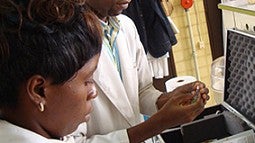As the world watches the unfolding Ebola crisis with increasing concern, the UO also is assessing programs that send students to West Africa to study. Decisions on whether to continue those programs are being made with the safety of students and faculty as the first priority.
But the university is contributing to the discussion in other ways also, using its expertise as a public research university to help inform issues such as why the virus has caused such a high level of fear. This collection of stories is meant to help the university community track our response to this public health threat.
A group email list initiated to serve Disaster Resilient Universities is now tracking Ebola responses and helping disaster planning in higher education
Leslie Steeves says the school is keeping a close watch on the Ebola epidemic as it ponders whether to take students to Ghana next summer
While the odds of infection are low, people's perceptions are driven by 'our gut feelings,' says Paul Slovic
The UO psychology professor discusses the 'dread factor' that deadly diseases create in the popular imagination and how that can cause overreaction
The Travel Clinic is just one of the many resources available through the University Health Center to keep the campus community healthy






